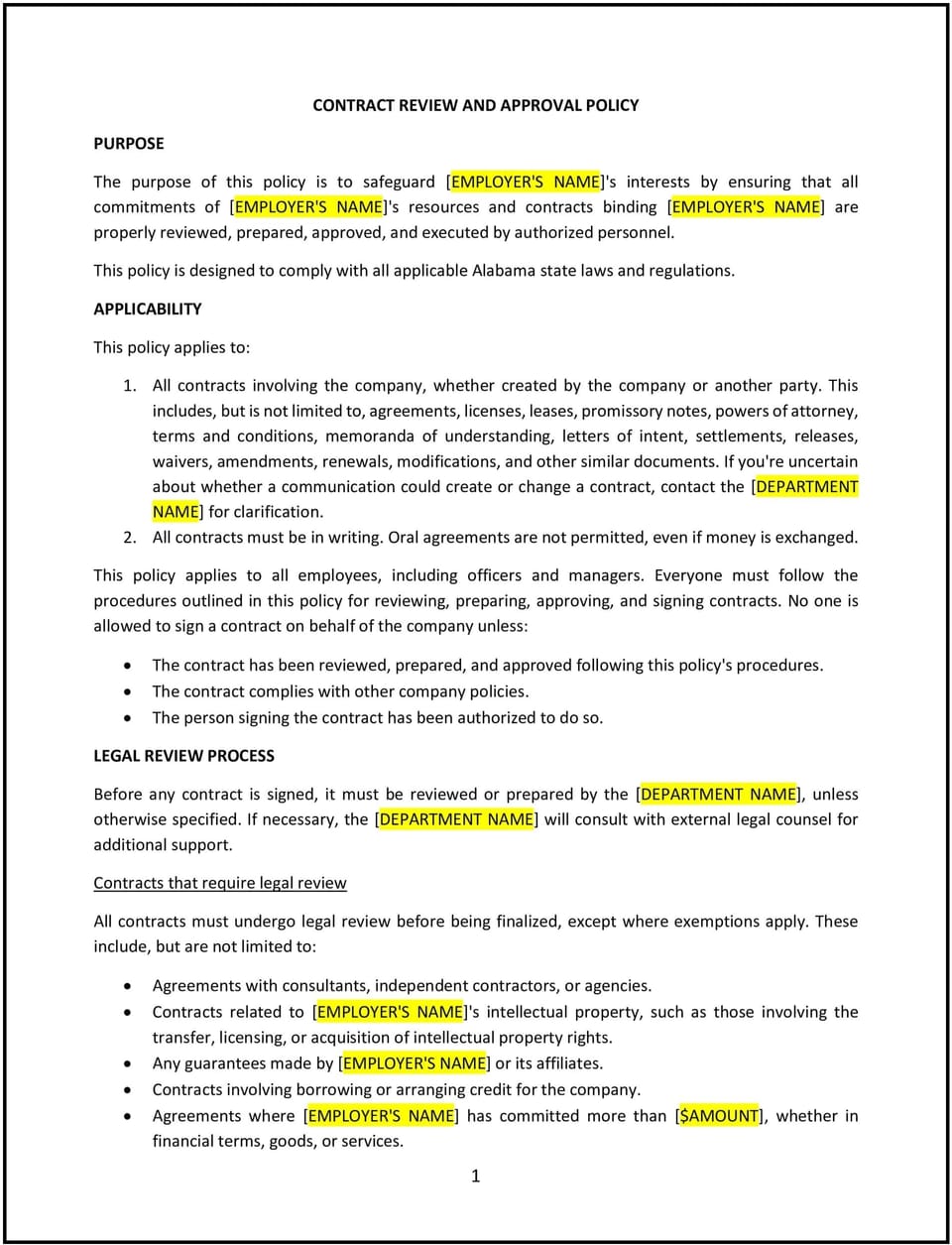Contract review and approval policy (Alabama): Free template

Contract review and approval policy (Alabama)
A contract review and approval policy establishes clear guidelines for reviewing, negotiating, and approving contracts within a business. For SMBs in Alabama, this policy is crucial for mitigating risks, ensuring legal compliance, and safeguarding the organization’s interests. By tailoring this policy to your specific business needs, you can streamline contract management and protect your company from potential legal disputes.
This policy helps create consistency in your contract processes, fosters collaboration between departments, and ensures that all agreements align with company goals and regulatory standards.
How to use this contract review and approval policy (Alabama)
- Define contract types: Specify the types of contracts that require review and approval, such as vendor agreements, customer contracts, or employment contracts.
- Outline the review process: Detail the steps for reviewing contracts, including legal, financial, and operational assessments. Ensure that all departments involved in the approval process understand their responsibilities.
- Set approval authority: Identify who has the authority to approve contracts at different stages. This could include department heads, legal teams, or executives, depending on the contract’s complexity.
- Ensure legal compliance: Align the policy with Alabama’s contract laws, including any state-specific regulations related to contract formation, execution, and enforcement.
- Provide training and resources: Offer training for staff involved in contract negotiations and reviews to ensure they understand legal requirements, company goals, and best practices.
Benefits of using a contract review and approval policy (Alabama)
A comprehensive contract review and approval policy helps your business manage risk, maintain compliance, and protect its interests. Here's how it benefits your company:
- Reduces legal risks: By ensuring all contracts are thoroughly reviewed and aligned with legal standards, you mitigate the risk of signing unfavorable or non-compliant agreements.
- Improves efficiency: A structured review and approval process speeds up contract negotiation, reduces delays, and ensures contracts are processed promptly.
- Enhances collaboration: Involving multiple departments in the contract review process ensures all perspectives are considered, leading to more balanced and effective agreements.
- Promotes consistency: Ensures that all contracts are reviewed and approved following the same standards, reducing the chance of errors or oversight.
- Strengthens compliance: Aligns with Alabama’s business regulations and legal requirements, reducing the likelihood of disputes or penalties.
Tips for implementing a contract review and approval policy (Alabama)
- Tailor the policy to your industry: For businesses in regulated industries such as healthcare, finance, or manufacturing in Alabama, ensure the policy accounts for specific compliance requirements.
- Create checklists for reviewers: Develop contract review checklists for legal, financial, and operational assessments to ensure every aspect of the contract is considered.
- Define timeframes for approval: Set clear timelines for how long contract reviews should take at each stage to avoid unnecessary delays.
- Incorporate a version control system: Use a version control system to track changes in contracts, ensuring that all stakeholders are reviewing the correct draft.
- Communicate with stakeholders: Ensure all relevant departments (e.g., legal, procurement, finance) are aware of the policy and understand their role in the review and approval process.
Q: Why does my business need a contract review and approval policy?
A: A contract review and approval policy ensures consistency, reduces risks, and ensures all contracts align with your business goals and legal standards.
Q: What types of contracts should be reviewed?
A: All contracts that have legal or financial implications, including vendor agreements, client contracts, employee agreements, and any other formal agreements.
Q: Who should be involved in the review process?
A: The legal team, relevant department heads, and financial officers should be involved, depending on the contract’s nature and complexity.
Q: How long does the contract review process take?
A: The timeframe will vary depending on the contract’s complexity, but establish standard timeframes (e.g., 5–7 business days) to keep the process efficient.
Q: Should contracts be approved by senior management?
A: Senior management should approve high-value or high-risk contracts, but other contracts can be approved by department heads or lower-level managers, depending on your policy.
Q: Can I approve a contract without legal review?
A: No, all contracts should undergo legal review to ensure compliance with Alabama’s laws and to protect your business interests.
This article contains general legal information and does not contain legal advice. Cobrief is not a law firm or a substitute for an attorney or law firm. The law is complex and changes often. For legal advice, please ask a lawyer.


